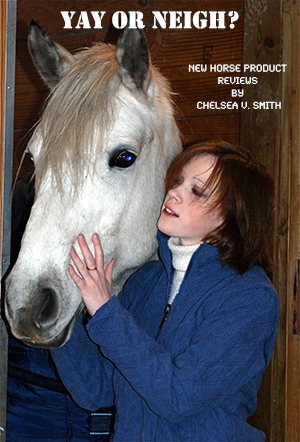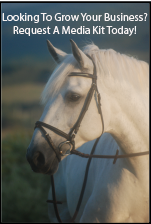Employ a Professional
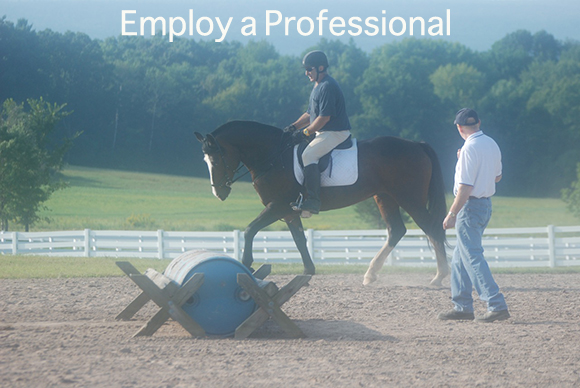
Finding the right help for yourself, or for you and your horse is not as complicated as you might initially think. While it may seem that there are a myriad of choices, when you carefully examine what your needs dictate and what your heart wants it is fairly simple to locate a good fit in an instructor or trainer by following a few simple rules.
If you need instruction and don’t own a horse then you need to ascertain a few simple truths about the barn and its instructors. It doesn’t matter whether you are a beginner, you are searching for a lesson barn for your child, are an intermediate or advanced rider returning to the sport. It also doesn’t matter which discipline you are shopping or if you even have a discipline. The beginner rider will start off with either English or Western and may migrate, an intermediate rider will more likely already have tried several disciplines and decided on a preference. The advanced rider will be looking for a knowledgeable specialist and may have already kissed a few frogs looking for that ‘Prince’. All that matters is that the person standing in the center of the ring is the perfect fit for your needs and wants.
So let’s forget about kissing too many frogs, and let’s look at what the main characteristics are for a good instructor and/or trainer you should demand and in which areas you can be negotiable.
Like the horses we love, our needs are individual. There is no ‘one size fits all’ especially at the higher levels of any equestrian sport. However, there are fundamental features that every instructor/trainer should bring to the arena.
Let’s look at ourselves in the physical sense first. Whether you are a petite eleven year old that weighs sixty pounds soaking wet or a six foot six inch chap weighing in around two hundred fifty pounds, or something in between, you need to find a lesson horse that fits you. One that is trained at least a little above where you are skill set wise and one that you do not burden or one on which you cannot ‘reach the pedals’. If you are buying or have your own horse a similar rules applies. Fit in this sense makes life easier. If you are a B personality get an A personality horse and vice-versa.
When searching for an instructor or trainer visit the barn and audit a few lessons. View the barn/arena/horses and other folks attending with a keen eye and ear. Are the horses well cared for? Do they know their job? Does the barn appear safe? Is the tack in good condition? Are the horses happy? Does the barn help seem happy? A good instructor/trainer will be the sort of person that runs a good staff. Not a barking commandant from the 3rd Reich.
When you audit the lesson pay attention to the teaching style. It should be encouraging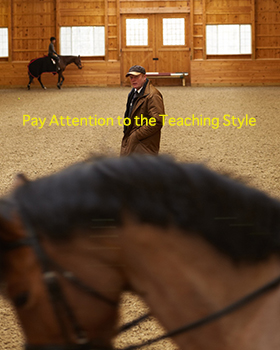 and the rider should appear more relaxed as the lesson proceeds and hopefully be grinning from ear to ear by the close. It can’t always happen this way but in my experience it usually does. Of course horses and riders can have off days. Mares can be fractious in season, new horses may have arrived and upset the herd dynamic or it could be a full moon! But overall, what is the energy of the barn and the lesson.
and the rider should appear more relaxed as the lesson proceeds and hopefully be grinning from ear to ear by the close. It can’t always happen this way but in my experience it usually does. Of course horses and riders can have off days. Mares can be fractious in season, new horses may have arrived and upset the herd dynamic or it could be a full moon! But overall, what is the energy of the barn and the lesson.
Don’t be shy to chat to other people at the arena rail. Ask them about their background, why they are standing there. Perhaps watching their child ride, perhaps waiting their turn. Ask lots of questions. Sharing is caring and horse folks are always keen to talk horses.
In my own international career I have had the opportunity to work with many name brands in my own particular spheres of firstly show jumping and then dressage. There were trainers, some Olympic level, that while I admired, I knew I could not possibly work with because they did not fit my needs. And those needs are pretty much the same for everyone. I was not interested in riding around the ring while the trainer sat in a chair in the corner chatting on his cell phone and making the occasional comment as you rode by, usually something derogatory. I was not interested in having the same comment shouted over and over to me while I was doing my best to understand the task or error of my riding. I was also not interested in having the trainer ride ninety percent of the lesson on my horse while I stood by and watched.
The instructor/trainer must be knowledgeable and open to sharing their hopefully wealth of advice with you. This is what you are paying them for after all. There should be no ‘salting’ of advice. It should not be eked out each lesson as a precious commodity and not gifted to you openly. A good instructor/trainer shares in your goals and will do their utmost to enthusiastically see you attain them. They should be secure in both their knowledge and their own achievements and bring to the arena advice offered in a myriad of different approaches. Flexibility in learning and training is key. Shouting at student is a ridiculous approach that I cannot even fathom. If the student did not understand the instruction the first time, or the horse for that matter, you might try a few times with the same language or aids. But after that you must adapt your approach and find one that works for their particular needs. This is where experience counts. Always search for the most experienced and proven trainer/instructor you can afford.
This is not to say that a less advanced instructor or trainer is a bad idea. But keep a weather eye on the long-term goal and be certain that they know the forward path to help you achieve your goals. There are many different professional certifications that trainers can attain. It is not necessarily an indication that the person will be the best fit for you, but it does indicate they have knowledge. A rider that has proven success in competition also demonstrates professional knowledge. It is prudent to do your homework by auditing their teaching methods and making your own evaluation. Not all talented riders are good teachers. Do not rely on social media sites for advice. Make your own judgment.
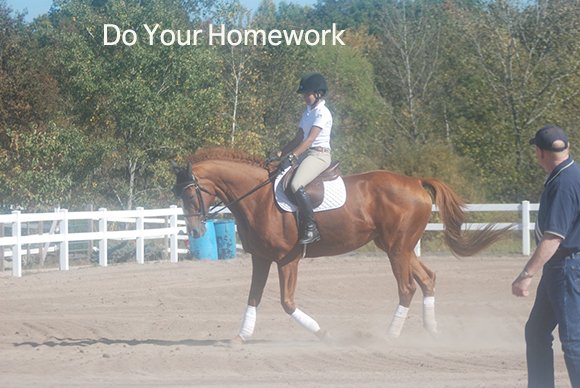
When evaluating an instructor/trainer look for a person who is kind and honorable to both the rider and the horse. There should be no shouting or demeaning of either horse or rider. Your instructor/trainer will be spending a hour at a time working with you and they should not be chatting on a cell phone, chatting on about their own lives or issues of the day. You are paying them to train/teach you and their energy and focus should be front and center on you at all times. This is something that you deserve and if you do not find you are valued, find another instructor/trainer.
It is also important to put aside your ego when searching for the perfect instructor/trainer.
There is little point in working with someone who makes unrealistic promises or who has unrealistic expectations. This is a two-sided issue. If you have unrealistic expectations of what you can achieve then any trainer is going to fall short in your eyes. Some riders have the “Fly me to the moon. Let me play among the stars,” syndrome and believe that they are headed to the Olympics. Some riders may achieve that goal and a positive attitude is very important, but some semblance of reality should be apparent. Similarly if your trainer promises you ‘the moon’ then in all likelihood they are selling you a dream and you are going to be disappointed after a few lessons. It is better to make a series of realistic goals together in small steps. A good trainer/instructor will encourage you and your horse to reach your full potential as a team and will know when to push and when to consolidate the training.
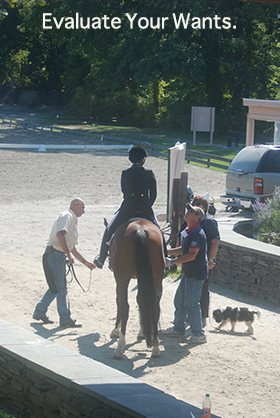 It is time to evaluate your wants. You may fancy yourself as a great athlete, about to burst on the equestrian scene or maybe you just want bragging rights for social media and your friends? Be honest with yourself. Always address your needs and not your wants. Big names may count you as one of many and take off showing all season long leaving you to a working student as an instructor who is just learning the ropes themselves. Quite likely not what you signed up for or were promised. It is important to be clear on what your needs are versus wants.
It is time to evaluate your wants. You may fancy yourself as a great athlete, about to burst on the equestrian scene or maybe you just want bragging rights for social media and your friends? Be honest with yourself. Always address your needs and not your wants. Big names may count you as one of many and take off showing all season long leaving you to a working student as an instructor who is just learning the ropes themselves. Quite likely not what you signed up for or were promised. It is important to be clear on what your needs are versus wants.
There is also the aspect of what is currently trending in your riding discipline. Don’t be fooled into working with a big name just because they are currently in the limelight. It is much more important to follow the simple rules of selection and find the right fit for you at the level you are riding.
As with any sport, continuing education is very important and your trainer/instructor should constantly be seeking to improve their knowledge, which will have a trickle down benefit to you. It truly does take more than one lifetime to learn everything there is to learn about horses and anyone that seems to ‘know it all’ most certainly doesn’t.
Above all remember that you should enjoy your lessons and time with horses. It should be fun and educational and your trainer/instructor should be able to have you smiling and enjoying yourself as you learn. People, like horses, do not learn well if they are not relaxed. Both rider and instructor/trainer need to put forth a good effort in every lesson and work together to overcome any obstacles that may arise.

